Louisiana is a state that faces various natural disasters, such as hurricanes, floods, and wildfires, making firefighting an essential service in the region. Firefighters in Louisiana work tirelessly to protect people, property, and the environment from the devastating effects of fires and other emergencies. As per the US Fire Administration, Louisiana recorded 2.1 deaths and 5.2 injuries per 1,000 fires, figures that are better than the national average of 2.3 deaths and 7.2 injuries.
Featured Programs and Schools
As per the US Bureau of Labor Statistics, 6,250 firefighters were working in Louisiana as of May 2022. If you’re passionate about helping others, enjoy working in a team, and have a desire to make a positive impact in your community, becoming a firefighter in Louisiana might be the perfect career for you. With a clear understanding of the requirements and training involved, along with dedication and hard work, you can pursue your dream of becoming a firefighter in Louisiana and make a real difference in the lives of others.

Steps to Become a Firefighter in Louisiana
To become a firefighter in Louisiana, one must follow these steps, gathered from reliable sources:
- A high school diploma or GED is necessary.
- Candidates must pass the civil service exam and the TABE test, which assesses aptitude at a 12th-grade English and 10th-grade math level.
- A valid driver’s license is required, and candidates must pass a background check, including criminal history.
- The screening process involves various academic, physical, and character tests. This includes an 11-event physical ability test (CPAT) and a firefighter interview process, along with drug and psychological screening.
- New recruits typically enter firefighter training programs, such as Firefighter I, after passing their recruitment tests. This training may be conducted with the department or at a fire academy. Some positions may also require EMT certification. Training programs, such as those offered by the Monroe department, can be rigorous and military-style, lasting up to 18 weeks.
- For Firefighter I certification, prerequisites include Hazardous Materials Operations and Basic First Aid/CPR. The certification process involves a practical skills examination and a written examination. Candidates must be at least 18 years old and achieve a passing score of 70% or higher on the written test.
- The Louisiana Fire & Emergency Training Academy (FETA) provides comprehensive training using real-life scenarios and props, preparing candidates for real-world emergencies. The core training includes the fundamentals of fire and emergency response, and the curriculum prepares individuals for certification exams.
- FETA offers a Recruit Fire Academy course for entry-level firefighters, taught under a paramilitary chain of command similar to modern fire departments. This course emphasizes the importance of proper training, physical ability, and discipline due to the inherent dangers of the profession.
These steps illustrate the rigorous process and comprehensive training required to become a firefighter in Louisiana, ensuring that candidates are well-prepared for the challenges of the job.
Salary of Firefighters in Louisiana
According to the US Bureau of Labor Statistics, firefighters earned the following mean and median salaries in Louisiana:
- Annual Mean Salary: $32,320.
- Annual Median Salary: $28,640.
As a point of reference, starting salaries of firefighters in two major Louisiana fire departments are mentioned below:
| Department | Position | Salary |
| New Orleans Fire Department | Certified Firefighter I | 36,119.00 per year |
| Baton Rouge Fire Department | Firefighter | $33,207.30 per year |
Career Outlook for Firefighters in Louisiana
O*Net Online predicts a 10% employment growth for firefighters in Louisiana from 2020 to 2030.
Firefighters Training Academies in Louisiana
In Louisiana, several major firefighter training academies offer comprehensive training programs for new recruits. These academies are:
Louisiana Fire & Emergency Training Academy (FETA)
- FETA, a part of the Louisiana State University system, provides real-life props and experienced staff to deliver realistic training experiences. Their focus is on preparing individuals and agencies to respond effectively to emergencies, with a strong emphasis on safety.
- FETA’s municipal training curriculum includes the fundamentals of fire and emergency response, ensuring that fire service personnel are academically prepared for their roles at all levels of fire and emergency service agencies.
- The Recruit Fire Academy course at FETA is designed for entry-level firefighters and is conducted under a paramilitary chain of command, emphasizing the importance of proper training, physical ability, and discipline.
LSU Fire and Emergency Training Institute
- The Louisiana State University Fire and Emergency Training Institute provides specialized training and education in fire and emergency services. This institute is known for its comprehensive training programs and experienced instructors.
Maritime and Industrial Training Center at Delgado Community College
- This center has earned a national and international reputation for high-quality training in Maritime and Industrial Fire Fighting. The experienced instructors at Delgado Community College provide training to licensed mariners and industry personnel in the Maritime, Oil and Gas, and Safety/Homeland Security fields, with the ability to tailor courses to meet specific company needs.
Bossier City Fire Academy
- Located in Bossier City, this academy trains firefighters, emergency medical technicians, and paramedics. The academy’s staff is certified to teach and evaluate in all areas of instruction for the Louisiana State University’s Fire and Emergency Training Institute, American Heart Association, and Louisiana Bureau of EMS.
- The 20-week program includes training and certification in Louisiana State Firefighter I and II classification, Hazardous Material Awareness and Operations Levels, and Emergency Medical Technician training to a National Standard.
References:
1)NOFD – Home – City of New Orleans: https://nola.gov/next/nofd/home/
2)Firefighters: https://www.bls.gov/oes/current/oes332011.htm
3)Louisiana Fire Loss and Fire Department Profile: https://www.usfa.fema.gov/statistics/states/louisiana.html
4)Firefighters: https://www.onetonline.org/link/summary/33-2011.00
